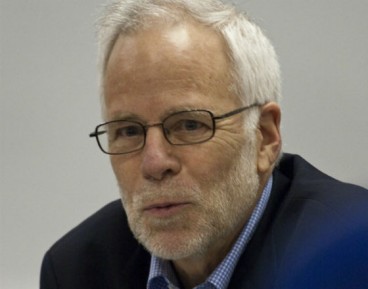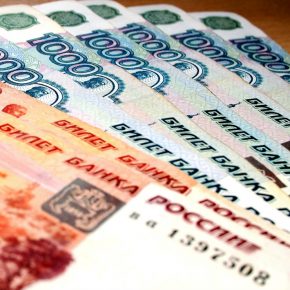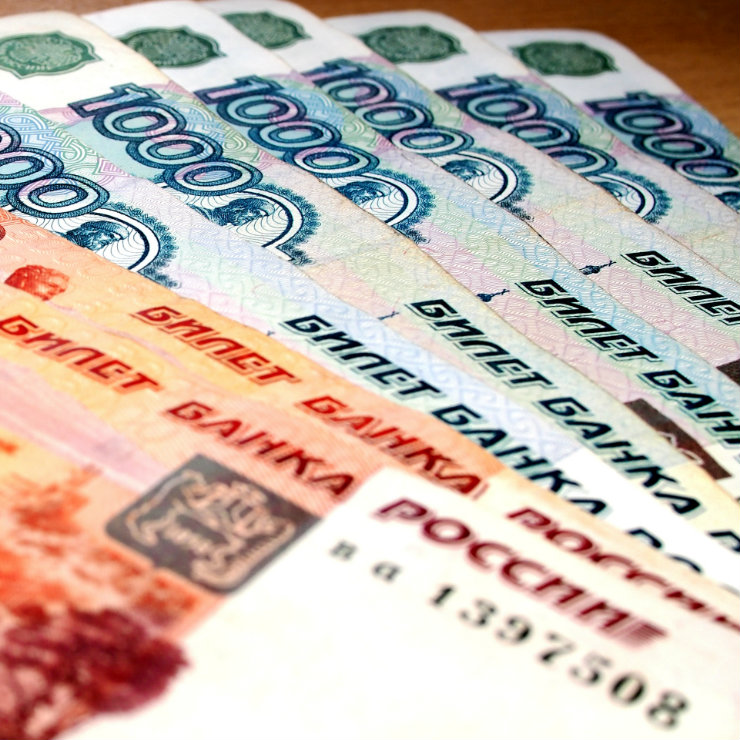Russia’s Great Escape
Category: Macroeconomics

(Petar Milošević, Public domain)
The proposals were presented at a meeting between the bank’s head Andrei Kostin and Russia’s President Vladimir Putin. “Our specialists have prepared a number of proposals aimed at further expansion of the use of the RUB in international settlements in order to develop the Russian market for the placement of Eurobonds, stocks, and the creation of other financial derivatives that are currently used only in the West,” Kostin said during the meeting.
The head of VTB Bank also asked Mr. Putin to push the government and the Central Bank to consider his banks’ proposals. He also pleaded with the Russian president to support the plans for de-dollarization and de-offshorization of the Russian economy.
The frequent guest on TV stations such as CNBC, Fox News, CNN, Bloomberg or BBC, Andrey Kostin was trying hard to convince Mr. Putin that Russia needs to develop its own financial instruments. “It would help protecting Russia’s financial sector from external factors and give a new impetus to the development of the market,” Mr. Kostin stated and used as an example of a positive trend towards de-dollarization of the Russian economy the fact that, in 2018, Russians became less interested in dollar deposits and loans and began to favor ruble denominated financial products.
Mr. Kostin has been an active promoter of the process of de-dollarization and de-offshorization of the Russian economy. At the International financial congress in June 2018, he spoke about the need for the global economy to gradually wean off the use of the USD in international financial transactions.
“The USD has already become too dangerous. In Russia, every grandmother is preoccupied with the exchange rate and constantly thinks about which currency to invest in. Everyone is an investor now,” Mr. Kostin commented on the growing volatility of the RUB/USD exchange. Concerning the need for de-offshorization of the Russian economy, he called for “re-registration” of the Russian economy. “All our enterprises, including the largest ones, are located in jurisdictions that even me, a member of the Russian Geographic Society, cannot locate on the map,” the banker was quoted by the Russian financial daily Vedomosti.
The Russian Central Bank seems to be on board with the plan. The Governor Elvira Nabiullina recently talked about the need to reduce the share of USD liabilities and banks’ assets held in the US currency. Among other measures, Russian commercial banks might be ordered to issue loans mainly in the national currency.
According to the former deputy Governor of the Russian central bank, Sergey Aleksashenko, the current economic climate in Russia is not the most conducive for such measures. “Given the current weakness of the Russian economy, it is impossible to increase the role of the ruble in international settlements. Russia and China have tried to use national currencies in mutual financial transactions in the past, but all these attempts eventually failed. You can’t force the world to do business using weak currencies,” Mr. Aleksaschenko said to Vedomosti.
Equal skepticism voiced another former deputy Governor, Oleg Vjugin. “On the international scale, the USD is still the main accounting currency, therefore it is highly unlikely that Russia could succeed in global de-dollarization of the world economy. You can try to switch to the settlement system in other currencies when importing and exporting products and services, but even then the USD will eventually appear somewhere in the settlement chain, making it impossible to protect any entity against sanctions,” mr. Vjugin was quoted by Vedomosti.
What many Russian economists agree on is the fact that the process of de-dollarization of the Russian economy has been underway for quite some time already. “As far as the domestic situation is concerned, the role of the USD has long been diminishing. Dependence on external loans decreases and USD denominated deposits continue to decline,” Mr. Vjugin added.
Possibly the biggest constrain on the de-dollarization of the Russian economy represent the actions of the Russia’s Finance Ministry that, in accordance with the fiscal rule, has been spending large sums of RUB to purchase USD.
The rule means excess revenues earned from raw material exports are sterilized in the fund, so it can’t force the appreciation of the currency. “And the effect is already visible on the exchange rate dynamics, as the correlation between the RUB and the cost of a barrel of oil has already been considerably weakened,” says Oleg Kouzmin, chief economist at Renaissance Capital.
The Russian Finance Ministry returned to the fiscal rule back in February 2017, when it began purchasing foreign reserves from oil and gas revenues exceeding the oil price baseline. With oil prices averaging around USD55, the Ministry spent RUB113bn on foreign currency markets last February. Overall, during the last year, Russia spent RUB830bn, for which it was able to purchase USD14bn. Over time, with the growing price of oil these purchases have been growing in significance. The ministry reached a record-high volume of purchases of RUB257bn in January this year, only to add another RUB40bn in February. If the price of oil stays above USD60 per barrel, the ministry will spend around RUB2.8 trillion this year, three-times more than last year.
The two competing financial policy orientation create an apparent contradiction. “On the one hand, the state supports the de-dollarization of the economy in every possible way, on the other hand, the Ministry of Finance continues to buy foreign currency on the domestic market at constantly increasing levels. These foreign currency purchases unavoidably put downward pressure on the value of the RUB against the USD, which, in turn, leads to a lower rate of investment of the population in RUB assets,” Sergey Suverov, from the BK Sberzheniya Fund, told Vedomosti.
Filip Brokeš is an analyst and a journalist specializing in international relations.



